中考英语语法专题复习--代词
- 格式:docx
- 大小:52.00 KB
- 文档页数:14
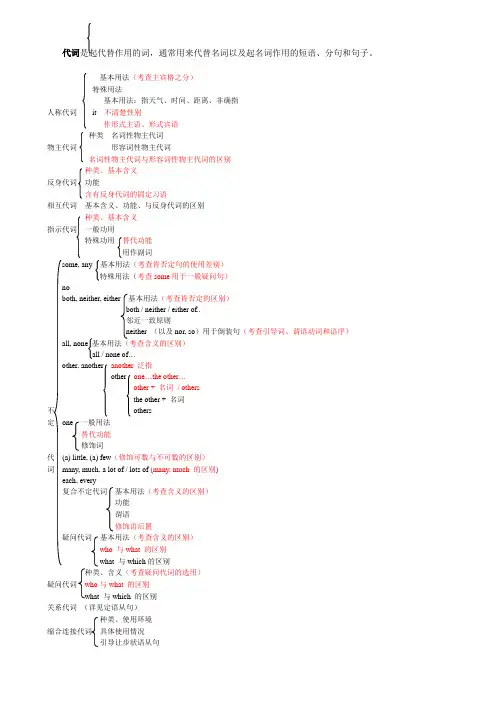
代词是起代替作用的词,通常用来代替名词以及起名词作用的短语、分句和句子。
基本用法(考查主宾格之分)特殊用法基本用法:指天气、时间、距离、非确指人称代词it 不清楚性别作形式主语、形式宾语种类名词性物主代词物主代词形容词性物主代词名词性物主代词与形容词性物主代词的区别种类、基本含义反身代词功能含有反身代词的固定习语相互代词基本含义、功能、与反身代词的区别种类、基本含义指示代词一般功用特殊功用替代功能用作副词some, any 基本用法(考查肯否定句的使用差别)特殊用法(考查some用于一般疑问句)noboth, neither, either 基本用法(考查肯否定的区别)both / neither / either of..邻近一致原则neither (以及nor, so)用于倒装句(考查引导词、谓语动词和语序)all, none 基本用法(考查含义的区别)all / none of…other, another another 泛指other one…the other…other + 名词/ othersthe other + 名词不others定one 一般用法替代功能修饰词代(a) little, (a) few(修饰可数与不可数的区别)词many, much, a lot of / lots of (many, much 的区别)each, every复合不定代词基本用法(考查含义的区别)功能谓语修饰语后置疑问代词基本用法(考查含义的区别)who 与what 的区别what 与which的区别种类、含义(考查疑问代词的选用)疑问代词who与what 的区别what 与which 的区别关系代词(详见定语从句)种类、使用环境缩合连接代词具体使用情况引导让步状语从句代词的种类: 代词可以分为九大类。
1. 人称代词 2. 物主代词 3. 反身代词 4. 相互代词 5. 指示代词 6. 不定代词 7. 疑问代词8. 关系代词(主要用于定语从句的引导)9. 连接代词(主要用于宾语从句、表语从句和主语从句的引导) 10.缩合连接代词中考主要考查前八类,尤以黄底部分为重点。
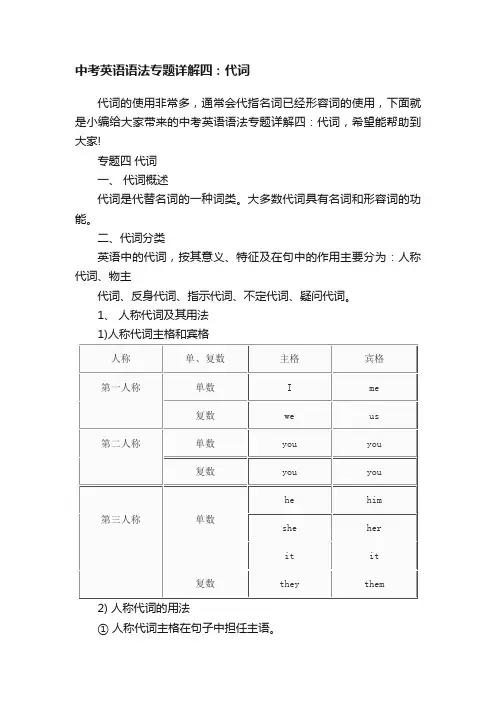
中考英语语法专题详解四:代词代词的使用非常多,通常会代指名词已经形容词的使用,下面就是小编给大家带来的中考英语语法专题详解四:代词,希望能帮助到大家!专题四代词一、代词概述代词是代替名词的一种词类。
大多数代词具有名词和形容词的功能。
二、代词分类英语中的代词,按其意义、特征及在句中的作用主要分为:人称代词、物主代词、反身代词、指示代词、不定代词、疑问代词。
1、人称代词及其用法1)人称代词主格和宾格2) 人称代词的用法① 人称代词主格在句子中担任主语。
例如:She likes watching movies.她喜欢看电影。
They have been to America twice他们到过美国两次。
② 人称代词宾格在句子中担任动词宾语、介词宾语或表语。
例如: We listen to them and they help us.我们听他们,他们帮我们。
---Who is knocking at the door? --It’s me.—谁在敲门?—是我。
2、物主代词及其用法1)形容词性和名词性物主代词① 形容词性物主代词相当于形容词,在句子中担任定语修饰名词,一般不单独使用。
例如:This is my book. Your book is over there.这是我的书。
你的书在那里。
They are our new friends.他们是我们的新朋友。
②名词性物主代词语法上相当于名词,意义上相当于“形容词性物主代词+名词”,经常用其来避免和前面提到的名词重复。
例如:This is my dictionary. Where is yours (=your dictionary)?这是我的词典。
你的(词典)在哪里?My idea is just the same as his(=his idea)。
我的想法正如他的(想法)。
3、反身代词及其用法1)反身代词的构成2)反身代词的用法① 反身代词在句子中担任动词宾语或介词宾语。
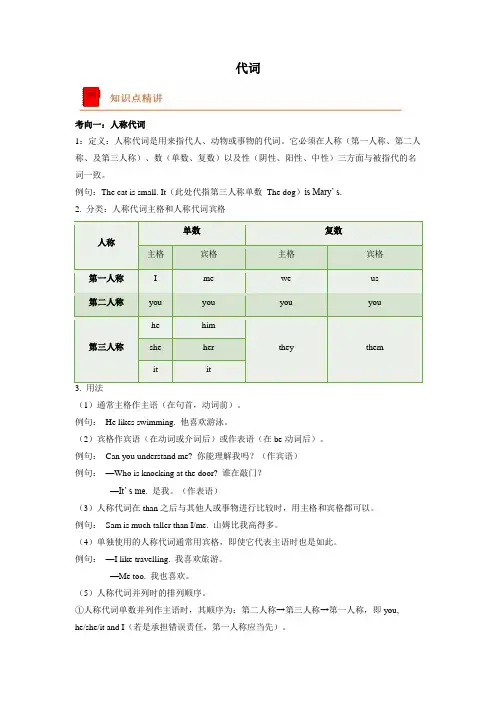
代词考向一:人称代词1:定义:人称代词是用来指代人、动物或事物的代词。
它必须在人称(第一人称、第二人称、及第三人称)、数(单数、复数)以及性(阴性、阳性、中性)三方面与被指代的名词一致。
例句:The cat is small. It(此处代指第三人称单数The dog)is Mary’ s.2. 分类:人称代词主格和人称代词宾格(1)通常主格作主语(在句首,动词前)。
例句:He likes swimming. 他喜欢游泳。
(2)宾格作宾语(在动词或介词后)或作表语(在be动词后)。
例句:Can you understand me? 你能理解我吗?(作宾语)例句:—Who is knocking at the door? 谁在敲门?—It’ s me. 是我。
(作表语)(3)人称代词在than之后与其他人或事物进行比较时,用主格和宾格都可以。
例句:Sam is much taller than I/me. 山姆比我高得多。
(4)单独使用的人称代词通常用宾格,即使它代表主语时也是如此。
例句:—I like travelling. 我喜欢旅游。
—Me too. 我也喜欢。
(5)人称代词并列时的排列顺序。
①人称代词单数并列作主语时,其顺序为:第二人称→第三人称→第一人称,即you,he/she/it and I(若是承担错误责任,第一人称应当先)。
例句:It was I and John that made her angry. 是我和约翰使她生气了。
②复数人称代词作主语时,其顺序为:第一人称→第二人称→第三人称,即we, you and they。
考向二:物主代词1. 定义:物主代词是表示所有关系的代词,用来说明某物属于某人或与某人有关。
2. 分类:(1)形容词性物主代词相当于形容词,只能放在名词前作定语,后面一定要跟一个名词。
my book,your name,their hobbies①放在被拥有的物体名词前,指明事物的归属者。
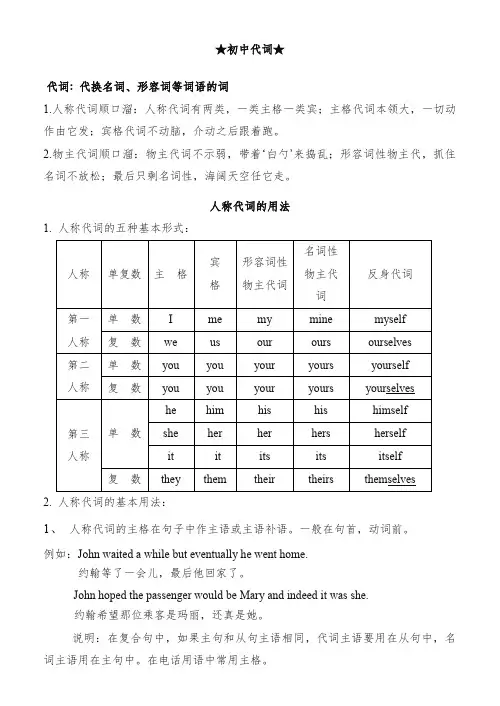
★初中代词★代词: 代换名词、形容词等词语的词1.人称代词顺口溜:人称代词有两类,一类主格一类宾;主格代词本领大,一切动作由它发;宾格代词不动脑,介动之后跟着跑。
2.物主代词顺口溜:物主代词不示弱,带着‘白勺’来捣乱;形容词性物主代,抓住名词不放松;最后只剩名词性,海阔天空任它走。
人称代词的用法1. 人称代词的五种基本形式:2. 人称代词的基本用法:1、人称代词的主格在句子中作主语或主语补语。
一般在句首,动词前。
例如:John waited a while but eventually he went home.约翰等了一会儿,最后他回家了。
John hoped the passenger would be Mary and indeed it was she.约翰希望那位乘客是玛丽,还真是她。
说明:在复合句中,如果主句和从句主语相同,代词主语要用在从句中,名词主语用在主句中。
在电话用语中常用主格。
例如:When he arrived, John went straight to the bank.约翰一到就直接去银行了。
I wish to speak to Mary. This is she.我想和玛丽通话,我就是玛丽。
2、人称代词的宾格在句中作宾语或表语,在动词或介词后。
例如:Do you know him?(作宾语) 你认识他吗?Who is knocking at the door?It’s me. (作表语)是谁在敲门?是我。
说明:单独使用的人称代词通常用宾格,即使它代表主语时也是如此。
例如:I like English. Me too.我喜欢英语。
我也喜欢。
3、注意:在动词be 或to be 后的人称代词视其前面的名词或代词而定。
例如:I thought it was she.我以为是她。
(主格----主格)I thought it to be her.(宾格----宾格)I was taken to be she.我被当成了她。
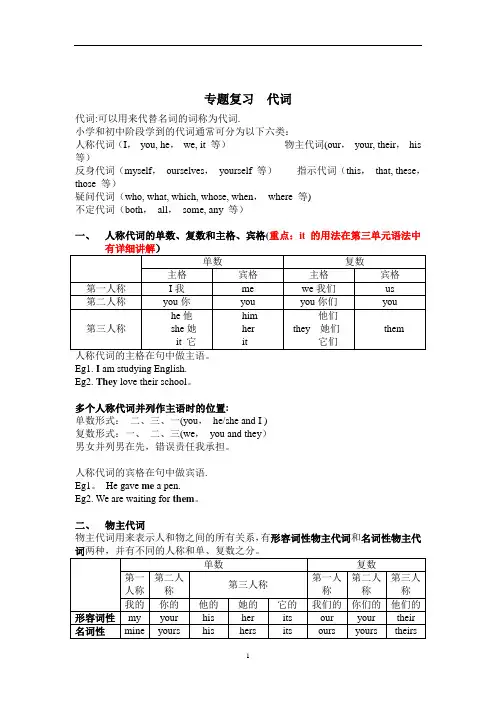
专题复习代词代词:可以用来代替名词的词称为代词.小学和初中阶段学到的代词通常可分为以下六类:人称代词(I,you, he,we, it 等)物主代词(our,your, their,his 等)反身代词(myself,ourselves,yourself 等)指示代词(this,that, these,those 等)疑问代词(who, what, which, whose, when,where 等)不定代词(both,all,some, any 等)一、人称代词的单数、复数和主格、宾格(重点:it的用法在第三单元语法中Eg1. I am studying English.Eg2. They love their school。
多个人称代词并列作主语时的位置:单数形式:二、三、一(you,he/she and I )复数形式:一、二、三(we,you and they)男女并列男在先,错误责任我承担。
人称代词的宾格在句中做宾语.Eg1。
He gave me a pen.Eg2. We are waiting for them。
二、物主代词物主代词用来表示人和物之间的所有关系,有形容词性物主代词和名词性物主代形容词性物主代词不能单独使用,只做定语,用来修饰其后的名词。
Eg1。
My parents are both doctors.Eg2。
There’s something wrong with his bike.名词性物主代词应独立使用,后面不跟名词,相当于形容词性物主代词+名词,在句中可以作主语、宾语或标语.Eg1. Our classroom is on the second floor,and theirs is on the fourth floor. (作主语) Eg2。
Let's clean their room first, and then clean ours. (作宾语)Eg3。
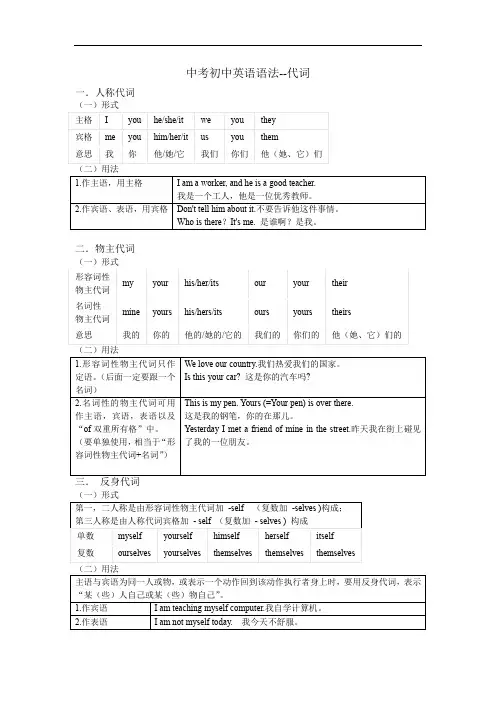
中考初中英语语法--代词一.人称代词(一)形式二.物主代词(一)形式(二)用法练一练一.写出代词形式二.用所给代词的适当形式填空1. That is not _________ kite. That kite is very small, but _________ is very big. ( I )2. The dress is _________. Give it to _________. ( she )3. Is this _________ watch? (you) No, it’s not _________ . ( I )4. _________ is my brother. ________ name is Jack. Look! Those stamps are _________. ( he )5. _________ dresses are red. (we) What colour are _________? ( you )6. Here are many dolls, which one is _________ ? ( she )7. I can find my toy, but where’s _________? ( you )8. Show _________ your kite, OK? (they)9. I have a beautiful cat. _________name is Mimi. These cakes are _________. ( it )10. Are these ________ tickets? No, ________ are not _________. ________ aren’t here. ( they )11. Shall _________ have a look at that classroom? That is _________ classroom. ( we )12. _________ is my aunt. Do you know _________ job? ( she )13. That is not _________ camera. _________is at home. ( he )14. Where are _________? I can’t find _________. Let’s call _________ parents. ( they )15. _________ don’t know her name. Would you please tell _________. ( we )16. So many dogs. Let’s count _________. ( they )17. I have a lovely brother. _________ is only 3. I like _________ very much. ( he )18. May I sit beside _________? ( you )19.The girl behind _________ is our friend. (she )20. They want a football . Give _______the green one, please. ( they )21.My skirt is better than_________. ( you)22.Mr. Smith is an old friend of_________ ( I).23. Mary, help _________to the bananas, please. ( you )24.They all enjoyed _________ at the party. ( they )25.Mr Wang teaches ______ maths and I teach ______computer.(I)参考答案:二.1.my;mine 2.hers; her 3.your;mine 4.He;His;his 5.Our;yours 6.hers 7.yours 8.them 9.Its ;its 10.their;they; theirs; Theirs 11. we; our 12.She;her 13.his; His 14.they;them;their 15.We;us 16.them 17.He;him 18.you 19.her 20.them 21.yours 22.mine 23.yourself 24. themselves25.me; myself一、英语阅读理解专项练习试卷1.阅读下列短文, 从每题所给的四个选项(A、B、C和D)中选出最佳选项。
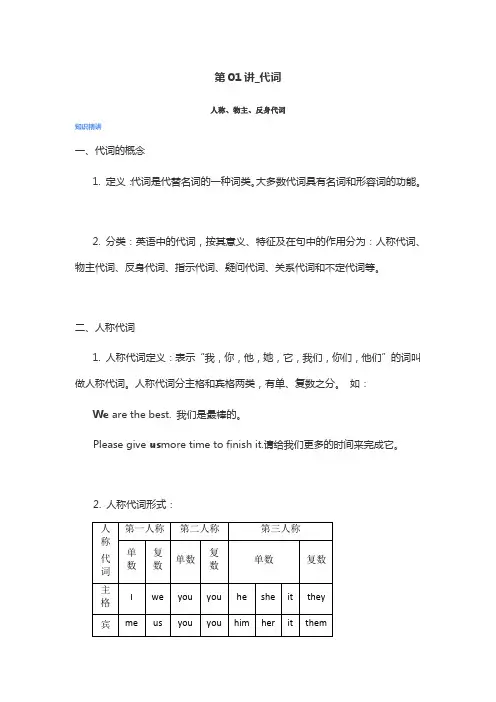
人称、物主、反身代词知识精讲一、代词的概念1. 定义:代词是代替名词的一种词类。
大多数代词具有名词和形容词的功能。
2. 分类:英语中的代词,按其意义、特征及在句中的作用分为:人称代词、物主代词、反身代词、指示代词、疑问代词、关系代词和不定代词等。
二、人称代词1. 人称代词定义:表示“我,你,他,她,它,我们,你们,他们”的词叫做人称代词。
人称代词分主格和宾格两类,有单、复数之分。
如:We are the best. 我们是最棒的。
Please give us more time to finish it.请给我们更多的时间来完成它。
2. 人称代词形式:3. 人称代词的用法:1). 主格:做主语。
如:You are good students. 你们是好学生。
2). 宾格:做宾语。
I love you. 我爱你。
如:She is looking at you.她正在看你。
3). 人称代词的语序:当几个人称代词并列充当主语时,单数形式(二、三、一)You, he and I复数形式(一、二、三)We, you and they第三人称男女两性并用时,男先女后He and she4). it 的用法:(1). 指前文提到过的事物。
如:This isn’t my book. It’s Dufu’s.这不是我的书。
它是杜福的。
(2). 指代时间/季节/天气/距离。
如:Which season is it? 现在是什么季节?It’s spring now. 现在是春天。
What’s the weather like today? 今天天气怎样?It’s hot. 今天很热。
How far is it? 那里有多远?It’s 10 kilometers. 10千米。
(3). 特殊句型It’s time to do sth. 该做......的时间了如:It’s time to go to bed. 该睡觉了。
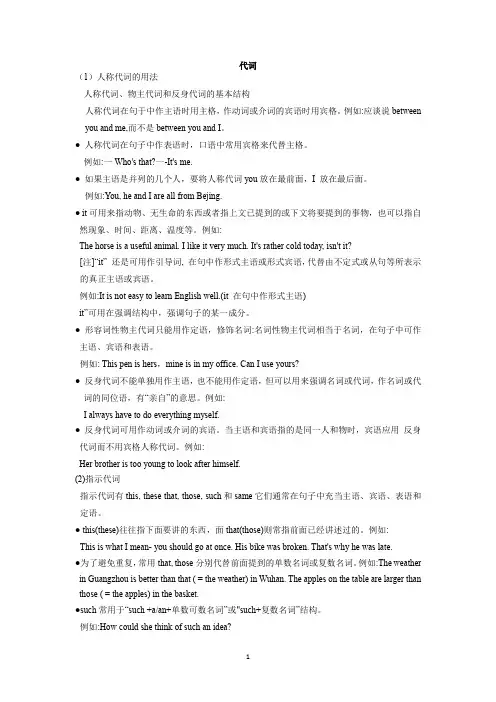
代词(1)人称代词的用法人称代词、物主代词和反身代词的基本结构人称代词在句于中作主语时用主格,作动词或介词的宾语时用宾格。
例如:应谈说between you and me,而不是between you and I。
● 人称代词在句子中作表语时,口语中常用宾格来代替主格。
例如:一Who's that?一-It's me.● 如果主语是并列的几个人,要将人称代词you放在最前面,I 放在最后面。
例如:You, he and I are all from Bejing.● it可用来指动物、无生命的东西或者指上文已提到的或下文将要提到的事物,也可以指自然现象、时间、距离、温度等。
例如:The horse is a useful animal. I like it very much. It's rather cold today, isn't it?[注]“it” 还是可用作引导词, 在句中作形式主语或形式宾语,代替由不定式或从句等所表示的真正主语或宾语。
例如:It is not easy to learn English well.(it 在句中作形式主语)it”可用在强调结构中,强调句子的某一成分。
● 形容词性物主代词只能用作定语,修饰名词:名词性物主代词相当于名词,在句子中可作主语、宾语和表语。
例如: This pen is hers,mine is in my office. Can I use yours?● 反身代词不能单独用作主语,也不能用作定语,但可以用来强调名词或代词,作名词或代词的同位语,有“亲自”的意思。
例如:I always have to do everything myself.● 反身代词可用作动词或介词的宾语。
当主语和宾语指的是同一人和物时,宾语应用反身代词而不用宾格人称代词。
例如:Her brother is too young to look after himself.(2)指示代词指示代词有this, these that, those, such和same它们通常在句子中充当主语、宾语、表语和定语。

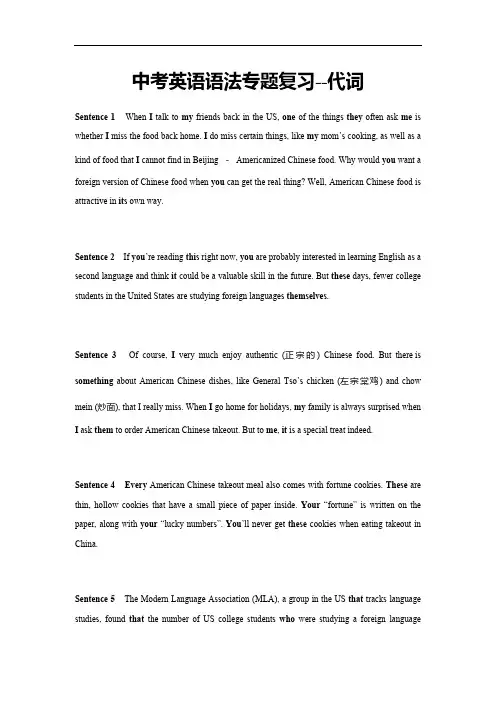
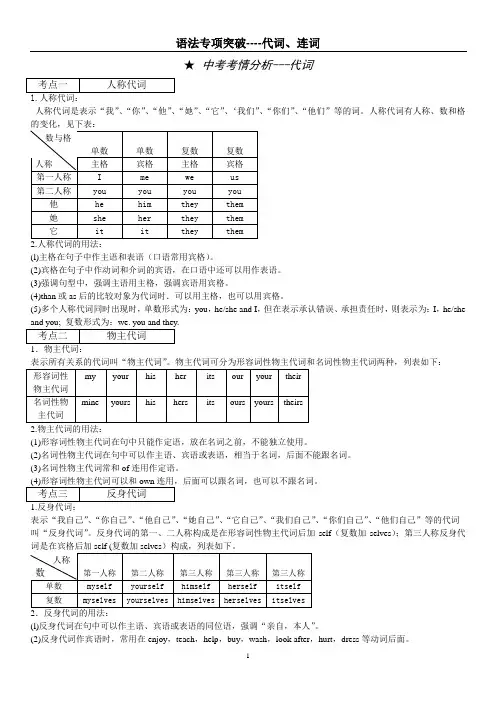
★中考考情分析---代词l.人称代词:人称代词是表示“我”、“你”、“他”、“她”、“它”、‘我们”、“你们”、“他们”等的词。
人称代词有人称、数和格的变化,见下表:(l)主格在句子中作主语和表语(口语常用宾格)。
(2)宾格在句子中作动词和介词的宾语,在口语中还可以用作表语。
(3)强调句型中,强调主语用主格,强调宾语用宾格。
(4)than或as后的比较对象为代词时.可以用主格,也可以用宾格。
(5)多个人称代词同时出现时,单数形式为:you,he/she and I,但在表示承认错误、承担责任时,则表示为:I,he/she1.物主代词:2.物主代词的用法:(1)形容词性物主代词在句中只能作定语,放在名词之前,不能独立使用。
(2)名词性物主代词在句中可以作主语、宾语或表语,相当于名词,后面不能跟名词。
(3)名词性物主代词常和of连用作定语。
表示“我自己”、“你自己”、“他自己”、“她自己”、“它自己”、“我们自己”、“你们自己”、“他们自己”等的代词叫“反身代词”。
反身代词的第一、二人称构成是在形容词性物主代词后加self(复数加selves);第三人称反身代(l)反身代词在句中可以作主语、宾语或表语的同位语,强调“亲自,本人”。
(2)反身代词作宾语时,常用在enjoy,teach,help,buy,wash,look after,hurt,dress等动词后面。
表示“这个”、“那个”、“这些”、“那些”等的代词叫“指示代词”。
指示代词在句中可以作主语、宾语、表语或定语。
2.指示代词的用法:(l)this 和these 表示在时间上或空间上较近的人或物。
(2)that 和those 表示在时间上或空间上较远的人或物。
(3)this 和these 可以表示前面叙述过的事,也可以表示将要说的或做的事;that 和those 只能指前面叙述过的事。
(4)在打电话时,常用that 询问对方是谁,用this 介绍自己。
中考英语必考代词一、人称代词(Personal Pronouns)人称代词用来代替特定的人或物体,常用于句子的主语或宾语位置。
在中考英语中,考生需熟练掌握以下常见的人称代词:1. 主格人称代词- I(我)- you(你)- he(他)- she(她)- it(它)- we(我们)- they(他们/她们/它们)2. 宾格人称代词- me(我)- you(你)- him(他)- her(她)- it(它)- us(我们)- them(他们/她们/它们)二、物主代词(Possessive Pronouns)物主代词用来表示某人所拥有的东西,常用于句子的定语位置。
1. 形容词性物主代词- my(我的)- your(你的)- his(他的)- her(她的)- its(它的)- our(我们的)- their(他们的/她们的/它们的)2. 名词性物主代词- mine(我的)- yours(你的)- his(他的)- hers(她的)- its(它的)- ours(我们的)- theirs(他们的/她们的/它们的)三、反身代词(Reflexive Pronouns)反身代词用于表示动作的发出者与承受者是同一个人或物,常常带有“自己”的含义。
- myself(我自己)- yourself(你自己)- himself(他自己)- herself(她自己)- itself(它自己)- ourselves(我们自己)- yourselves(你们自己)- themselves(他们/她们/它们自己)以上是中考英语中必考的代词内容,希望能对你有所帮助!。
中考英语语法复习一、名词【中考考点】1.正确识别可数名词和不可数名词。
2.掌握可数名词复数的构成。
3.掌握名词所有格和名词作定语的用法。
(一)不可数名词1.概述不可数名词:不能直接用数字计数的词。
分为物质名词(表示构成世上万物的物质或材料的名称的词,如water,wood,milk等)抽象名词(表示性质、行为、状态、情感等抽象概念名称的词,如fun,happiness,health等)。
必须要记住的不可数名词:液体类water, milk,juice, orange, coffee, tea, coke,ink,rain, wine食物类meat,fish,chicken, beef,pork,mutton,rice, salt,sugar, porridge, bread语言类Chinese,Japanese, English,French,German,Russian材料类metal, paper,glass,grass, bamboo,cotton, silk,wool, wood, hair, plastic其他类snow,ice,wind,sunshine,news,music,weather,money, knowledge, homework, housework,teamwork, help, information, rubbish (waste), light,medicine2.不可数名词的量化表达(1)借助some,much,little,a little, a lotof,lots of,plenty of等来表示。
如:muchwater, some orange juice, a little milk(2)借助容器来表示。
如:一杯a cup of tea十袋米 ten bags of rice(3)借助计量单位来表示。
如:一张纸a piece of paper-片面包 a slice of bread3.既可数又不可数的名词有些名词既能用作可数名词,又能用作不可数名词,但意义不同。
代词Ⅰ.单项选择1.—It is raining heavily but I don't have an umbrella with me. —Don't worry! I have got one.You can share .A. yoursB. oursC. mineD. theirs2.—What would you like, ice cream or apple juice?—. One for my sister and the other for myself.A. NeitherB. AllC. NoneD. Both3.The picture book must be Lily's, for name is on it.A. myB. hisC. itsD. her4.—What a nice model plane!—Thanks.I made it with a 3D printer by .A. themselvesB. itselfC. myselfD. herself5.—I want to get some change, but I can't find a bank here. —I know next to the People's Hospital.A.itB.thatC.oneD.this6.After-school activities help students gain more skills and teach to care about others.A.meB.youC.themD.him7.The main difference between our brains and those of monkeys is that are much bigger and smarter.B.oursC.weD.our8.—Do you want tea or coffee?— is OK. I really don't mind.A. NeitherB. BothC. EitherD. None9.Think twice and make the decision. else can do it for you.A. SomebodyB. EverybodyC. AnybodyD. Nobody10—Amazing!Tom got the best grade in the test last week. — is impossible. He studies really hard online this term.A. AnythingB. NothingC. EverythingD. Something11.—I'm afraid I can't get to the top of the mountain. —Believe in .Try your best and you will make it.A.youB.yourC.yourselfD.yours12.—Ben, may I borrow your dictionary?—Sorry, I'm using it now. You can ask Maria for .A.mineB.hersC.hisD.theirs13.Mr.Wang is coming to our school. I can't wait to see.A.hisB.heC.himselfD.him14.—How much difficulty did you have solving this problem? —. It's quite easy.A.NobodyB.BothC.NoneD.Neither15.It's one thing to have a dream, but quite to realize it.A. otherB. anotherC. the otherD. othersⅡ.用括号中所给词的适当形式填空1.It's late autumn now. The tree has lost all of (it) leaves.2.Their mother heard the two boys arguing and came out.She told (they) to take turns to ride the bike.3.Jack is happy, because Mr.Lee, an excellent teacher,teaches (he) English this term.4.Mrs. Smith will be free soon and you can wait for (she) in the meeting room.5.The couple enjoyed (they) trip to Sanya during the vacation.6.The dictionary on the desk is (your). (I) is on the chair over there.7.Mars Base 1 Camp was built in Jinchang, Gansu, to let young people experience for (they).8.The family photos aren't in my room, it must be in (he).9.We're practicing spoken English. Would you like to join (we)?10.Don't ask what this country can do for you, ask (you) what you can do for this country.11.Mary and (she) classmates are busy preparing for (they) final examination.12.Timmy and I are good friends and he will surely keep secrets for (I).13.These are my gloves. (she) are in the drawer.14.That night, we sat around the fire to keep (we) warm.15.Could you move (you) car? It gets in my way.参考答案Ⅰ.1—5 CDDCC 6—10 CBCDB 11—15 CBDCBⅡ.1.its 2.them 3.him 4.her 5.their 6.yours; Mine7.themselves 8.his 10.yourself/yourselves11.her; their 12.me 13.Hers 14.ourselves 15.your形容词和副词( )1. -What does the lady look like?- .A. She's fine and wellB. She's really a nice ladyC. Shes tall and thinD. She likes wearing skirts ( )2. -What do you think of his speech?-Oh. wonderful. But he sounded really when he first started speaking.A. aloudB. worriedC.nervousD. quiet ( )3. you work, knowledge you’ll get.A. The harder; moreB. The harder; the moreC. Harder; the moreD. Harder; more( )4. Don't worry. She can look after your pet .A. careful enoughB. enough carefulC. carefully enoughD. enough carefully( )5. John's joke made the poor laugh. Nothing wasat that moment.A. worseB. betterC. worstD. best( )6. -I heard Mary and Peter fell in love with each other.-They'd better not, because it's bad for their study .A. in and outB. near or farC. more or lessD. up anddown( )7. It's raining .They have to stay at home.A. badlyB. loudlyC. heavilyD. hardly( )8.- Knowledge is money.-But I think it is money.A. as important asB. so important asC. the same asD. more important than( )9.-I think our chemistry teacher is working hard. He teaches us .-Yes, but he hasn't come today. He doesn't feel .A. good; wellB. good; goodC. well; goodD. well; well( )10. Beijing, the capital of China, is one ofcities in the world.A. the biggestB. biggerC. much biggerD. big( )11. The experts think that India's population may be than China’s 2020.A.much; byB. more; inC. larger; byD. larger; on( )12. The price of this computer is the of thethree.A. smallestB. biggestC. highestD. tallest( )13. Mount Qomolangma, "the roof of the world”, is as as 8844. 13 meters.A. highB. higherC. highestD. highly( )14. The new road is much than before. Six carscan pass it at the same time.A. largerB. fartherC. widerD. rougher( )15. After meeting my friend at the airport, I drove her to the hotel.A. clearlyB. directlyC. luckilyD. exactly( )16. Our teacher wants us to be when we talk withthe foreigners.A. comfortableB.unusualC. gratefulD.confident( )17. Miss Green is more warm-hearted, so she isbusier than allthe nurses in the hospital.A. othersB. otherC. the otherD. another( )18.On sides of the street are a lot of colourful flowers.A. eachB. bothC. eitherD. all( )19. She told us a story. Her voice sounded .A. sweetB. smallC. clearlyD. sadly( )20. -I feel really before the interview.-Take it easy. Be sure you are the best.A. patientB.seriousC. nervousD. cool( )21. -You are standing too near to the TV. Can you movea bit ?- OK, Mum. Is it all right here?A. fasterB. slowerC. fartherD. nearer( )22. -How was the weather yesterday?-It was terrible. It rained . People could goout.A. hardly; hardlyB. hard; hardC. hard; hardlyD. hardly; hard( )23. Daniel plays chess if not better than David.A. as wellB. as well asC. so wellD. so wellas( )24. China has a population than country in the world.A. large; anyB. large; any otherC. larger; anyD. larger; any other( )25. The cake Mrs. Black made looks ,but it tastes .A. bad; goodB. bad; wellC. badly; goodD. badly; well( )26. -What a traffic jam! I am late again.-Yes, the traffic is than it used to be.A. very goodB. even betterC. very badD. even worse ( )27.-I'm going to buy another skirt.-Hey, you'd better be with your money.A. busyB. kindC. freeD. careful( )28. He is of the two men.A. olderB. the olderC. oldD. the old ( )29. The lessons given by Mr. Smith are always and interesting.A. lovingB. lovelyC. livelyD. love( )30. She is ,but she doesn't feel .A.alone, aloneB. lonely, aloneC. alone, lonelyD. lonely, lonely参考答案1-5 CCBCB 6-10 CCDDA 11-15 CCACB 16-20 DCBAC21-25 CCBDA 26-30 DDBCC复合句Ⅰ.单项选择|宾语从句|1. Always tell your parents you are going andyou expect to be home.A.what; whereB.when; whereC.where; when2.—Do you know to see the Beijing Opera?—Yes, you can go to Mei Lanfang Theatre.A.where can we goB.where we can goC.when shall we go3.—Excuse me. Could you tell me ?—In half an hour.A.what time does the plane take offB.what time the plane takes offC.what time did the plane take off4.—Dad, can you tell me ?I miss her very much. —Next week, dear.A.where my mum will goB.when will my mum come backC.when my mum will come back5.—Tom, I wonder .—In Beijing, the first city to host both the Summer and Winter Olympics.A.where will the 24th Winter Olympics be heldB.where the 24th Winter Olympics will holdC.where the 24th Winter Olympics will be held6.—Welcome back to school, Tim. I want to knowonline.—Of course, Ms. Clark, I was hard-working.A.if you studied hardB.what you studiedC.when you studied7.—Excuse me, Mr. Wang. Do you know ?—Yes. It's on May 20th.A.when is the school tripB.how we can go thereC.when the school trip is8. Wow, your dress is so beautiful. Could you tellme ?—Oh. I bought it in an online store.A.when you bought itB.where you bought itC.how much you spent on it9.—Could you tell me to the art museum?—Sure. Bus No. 26.A.why you will goB.how I can getC.which bus I can take10.—Mr. Wu, can you tell me ?—We get together and eat mooncakes.A.how do you celebrate the Mid-Autumn FestivalB.how Chinese people celebrate the Chinese New YearC.what Chinese people usually do on the Mid-Autumn Festival11. Jenny just wondered Angela already knew about the event.A.how muchB.how manyC.how often12.—Excuse me, would you please tell me ? —Certainly. It's about ten minutes' walk.A.where is the nearest shopB.how far the nearest shop isC.how soon can I reach the nearest shop13.—What did Lily say to you just now, Emma?—She wanted to know .A.what will I do this SundayB.why I am late for class this morningC.if I could go shopping with her tonight14.—Could you tell me ?—Sure, go along this street, and turn left at the second crossing. You'll find the bank on your right.A.how I can get to the Bank of ChinaB.where is the Bank of ChinaC.where can I find the Bank of China15.—Mum, can you tell me I can wear the face mask(口罩)?—Cover your face and nose with it and make sure there's no space between them.A.whenB.howC.where16. The school suggested the students pass on they have learned to their parents.A.whatB.thatC.which17.—Could you tell me ?—Throwing off poverty (脱贫).A.who people often talk about this yearB.what people often talk about this yearC.which do people often talk about this year18.—Do you know ?—Sorry, I've never had an e-book before. Why not read the instructions first?A.how can I turn the e-book onB.how I can turn the e-book onC.where can I buy an e-book19.—Do you know ?—At 9:00 tomorrow morning.A.when the video meeting beganB.when did the video meeting beginC.when the video meeting will begin20. My cousin will drive me to school today, but I don't know .A.what he'll doB.where he'll goC.when we'll leave21.—What did Tom say to you just now, John?—He asked .A.what I am so happy todayB.what will I do for the weekendC.if I could go to the movies with him tonight22.—Could you please tell me ?—Sure. On Friday afternoon.A.where the book sale isB.when the book sale isC.what the book sale is about|状语从句|1.—Excuse me. Where is the nearest hotel?—Just go down this road you see a library. It's across from it.A.untilB.becauseC.though2.—Louis, are you leaving for Guilin for your trip tomorrow? —No. It will be two days I start my trip.A.afterB.asC.before3.You can succeed in anything you put your mind to it.A.unlessB.ifC.though4.—What do you feel you are looking through the old pictures?—How time flies.A.becauseB.thoughC.while5.—Tom, I hear that we can't take photos here in order to protect the paintings.—Really? But there is a sign saying “You will not be allowed to take photos you use a camera without a flash.”A.ifB.whenC.unless6. Swimming is, of course, interesting. But we plan to go swimming, being safe must come first.A.thoughB.whenC.unless7. The band never starts performing all the seats are taken.A.becauseB.untilC.but8.—I'm wondering whether I could watch Frozen 2; after all I've grown up a little bit.—Well, I watched it yesterday. the film is to meet the needs of children, I promise you'll be also pleased with it.A.BecauseB.AlthoughC.As9.—Did Tom get good grades in the final math exam?—Yes, he did. To my surprise, he could get overdifficult problems he succeeded at last.A.so; thatB.such; thatC.too; to10.A lot of people like reading newspapers they can learn what is happening in the world.A.so thatB.even thoughC.as soon as11. Restaurants must stop offering free plastic bags in Beijing customers ask for them.A.sinceB.unlessC.because12.—What do you think of your junior high school life?—I think it is enjoyable, I sometimes have some trouble in study.A.ifB.thoughC.while13.Emma was afraid of the dog when she was young. She would run away she saw it.A.so thatB.as soon asC.ever since14.—Did you say anything to your parents they shouted at you?—No, I was afraid to talk back. They looked really serious and scary.A.unlessB.whyC.when15.Our teachers have been with us for nearly three yearswe came to junior high school. We should thank them for what they have done for us.A.untilB.beforeC.since16. it is often cold in the mountains, you need to wear warm clothes.A.ThoughB.UnlessC.As17. I do, I do it for you. Do not ever doubt that, my boy.A.WhateverB.WhereverC.Whenever18.—I'm afraid e-books might be bad for our eyes. —Hmm, but they will be helpful for us we put them to good use.A.so thatB.as long asC.even though19.It's hard for us to say goodbye we have so many happy days to remember.A.soB.becauseC.although|定语从句|Ⅰ.单项选择1. We are supposed to care about the workers keep our city clean.A.whichB.whoC.whom2.—Do you know the old man wears glasses on TV? —Of course. He's Zhong Nanshan.A.whoB.whomC.which3. The book cover has a beautiful picture is Lily's.A.whichB.whoseC.that4. In America, Thanksgiving is a holiday celebrates the love of family.A.whoB./C.that5.—What are they talking about?—They are talking about the greatest inventions have made a big difference to our daily life.A.whichB.whoC.that6.—Have you seen the film The Wandering Earth?—Yes, it's the best one I have ever seen.A.thatB.whichC.what7.—Do you know the girl is giving the speech?—Of course. She is my best friend, Meimei.A.whichB.whoC.whom8.[2020·牡丹江]Parasite(《寄生虫》) became the firstnon-English best movie has won Oscars in history.A.thatB.whichC.who9. Would you please tell me about the plan you made you leave?A.who; afterB.what; whenC.that; before10. Du Fu is a great Chinese poet has become popular with many people around the world.A.whichB.whomC.who11. Today I can see a hall full of talented teens graduated from Changsha International Experimental Middle School,eyes are full of hope for the future.A.whereB.whoC.whose12.—Is that all?—Yes. That's all I want to take.A.whichB.thatC.who13. Children like stories have happy endings, and so do many old people.A.whoB.whichC.what14. The engineer my father works is about 50 years old.A.whoB.as whomC.with whom15.—Frank, look! Who are the children under the tree waiting in line?—They are the students from No.1 Primary School.A.that areB.where areC.which is16.All of us will never forget the great time we spent together in our school though it's time to say goodbye.A.whichB.whenC.what17.—What are you doing?—We are talking about the books and writers we like.A.thatB.whichC.who18.My hometown is the place holds all my sweet memories.A.whoB.whichC.what19.Yesterday Mr. Green went to his hometown and visited the old house he was born in.A.whichB.whereC.what20.I will never forget the time the talented kids realized their dreams.A.thatB.whenC.whichⅡ.翻译1.他们认为家庭作业给孩子们太多的压力。
中考英语语法专题复习--代词Sentence 1 When I talk to my friends back in the US, one of the things they often ask me is whether I miss the food back home. I do miss certain things, like my mom’s cooking, as well as a kind of food that I cannot find in Beijing -Americanized Chinese food. Why would you want a foreign version of Chinese food when you can get the real thing? Well, American Chinese food is attractive in its own way.Sentence 2 If you’re reading this right now, you are probably interested in learning English as a second language and think it could be a valuable skill in the future. But these days, fewer college students in the United States are studying foreign languages themselves.Sentence 3 Of course, I very much enjoy authentic (正宗的) Chinese food. But there is something about American Chinese dishes, like General Tso’s chicken (左宗棠鸡) and chow mein (炒面), that I really miss. When I go home for holidays, my family is always surprised when I ask them to order American Chinese takeout. But to me, it is a special treat indeed.Sentence 4 Every American Chinese takeout meal also comes with fortune cookies. These are thin, hollow cookies that have a small piece of paper inside. Your “fortune” is written on the paper, along with your “lucky numbers”. You’ll never get these cookies when eating takeout in China.Sentence 5 The Modern Language Association (MLA), a group in the US that tracks language studies, found that the number of US college students who were studying a foreign language dropped by 9 percent from 2013 to 2016, Quartz reported. And the number is still decreasing.代词(Pronouns)是代替名词以及起名词作用的短语、句子和句子的词,因此,代词的使用必须和它所替代的词性在人称、数和格上保持一致。
大多数代词具有指代和修饰的功能。
正确运用代词可以使句子简洁、明快,但是如果使用不当,也容易产生意义理解上的偏差。
在平时的学习过程中,应注意正确、恰当地使用代词。
一人称代词(1)人称代词的分类(2)人称代词的句法功能□1作主语人称代词作主语时用主格Look at the girl in the red skirt. She is my new classmate.□2作宾语人称代词作宾语时用宾格It is a good habit for me to read a few lines before going to bed.□3作表语人称代词作表语时用主格,但在口语中常用宾格---Who is knocking at the door? ---It’s me.(3)人称代词的用法□1I, we和you的用法【注意】主格I在句子中的任何位置都要大写□2we, you, they和he的用法□3he和she的用法□4并列人称代词的使用顺序□5it的用法二物主代词(1)物主代词的分类(2)物主代词的用法□1形容词性物主代词□2名词性物主代词三反身代词表示动作回到其执行者本身,用以加强语气,意为“我(们)自己” 、“你(们)自己” 、“他(们)自己” 的代词。
(1)反身代词的分类(2)反身代词的句法功能反身代词与他所替代的名词或代词形成互指关系,在人称和数上保持一致,可在句中作宾语、表语、同位语。
□1作宾语□2作表语□3作同位语(3)反身代词的用法□1反身代词用来加强语气□2反身代词用于固定搭配中四指示代词是用来指代或标记人或事物的名词,表示“这个/些“ ”那个/些“。
常用的指示代词有this/ that/ these/ those(1)指示代词的基本用法□1this/ these指代或修饰在时间上或空间上较近的人或物,that/those指代或修饰在时间上或空间上较远的人或物。
This is my new friend. / He likes these flowers very much.That is a lovely dog. / In those days they had a hard time.□2that还可以指上文提到的事物,this指下文中将要提到的事物。
He got up late. That’s why he was late for class. / Please remember this: No pains, no gains.□3打电话时,常用this介绍自己,用that来询问对方是谁。
Hello, this is Mike. Who is that speaking?(2)this 和that作替代词的用法为了避免重复,that可替代前面提到的单数可数名词或不可数名词,those 可替代复数可数名词。
The weather in summer in Beijing is cooler than that in Shanghai. / The days in summer are longer than those inwinter.五不定代词不明确指代某个人、某个事物、某些人、某些事物的词。
不定代词的用法比较复杂,在掌握不定代词的用法的同时,有必要把意义相近而用法不同的不定代词进行比较。
不定代词分为两大类,即普通不定代词和复合不定代词。
【拓展】从词义上看,不定代词可以分为四类:□1表示肯定意义的不定代词some; somebody; something□2表示非肯定意义的不定代词any; anyone; anybody; anything; either□3表示否定意义的不定代词none; no one; nobody; nothing; neither□4表示普遍意义的不定代词all; both; each; everyone; everybody; everything(1)some, any□1表示“一些“时,some与any既可以修饰或指代可数名词,也可以修饰和指代不可数名词。
一般说来,some 用于肯定句,any用于否定句、疑问句或条件状语从句。
Some say yes, and some say no. / There is not any water in the bottle. / Do you have any brothers or sisters?□2some用于疑问句时,表建议、请求、邀请等,或者希望得到对方的肯定回答。
Could you buy me some stamps when you pass the pose office? / Can you lend me some picture-books?□3any用于肯定句时,表示“任何的,任何一个“。
The medicine is on sale everywhere. You can get it at any chemist’s.□4“some/any + …“结构作主语时,谓语动词的单复数需要根据of后面的名词的单复数而定。
Some of the food has gone sour. / Are any of the paintings for sale?(2)all, both□1all和both都意为“都“。
all指三者或三者以上的人或物;both则指两个人或物。
All of them have now become singers. / Both of them are from England.【拓展】all用来代替或修饰复数可数名词时,谓语动词用复数形式;all用来代替或修饰不可数名词时,位于动词用单数形式;both作主语时,谓语动词用复数形式。
□2all, both作主语的同位语时,应位于实义动词之后,连系动词be、助动词或情态动词之后。
My parents both like tea very much. / Kate’s kids are both beautiful and clever. / You should all hand in your homework.(3)one□1one可以用来代替单数可数名词,表示泛指意义;ones用来代替复数可数名词。
I’ve been looking for a dictionary, but I can’t find one. / Shanghai has a lot of old buildings, but it also has manynew ones.□2one可指代不特定的人、表示“一个人,人们“。